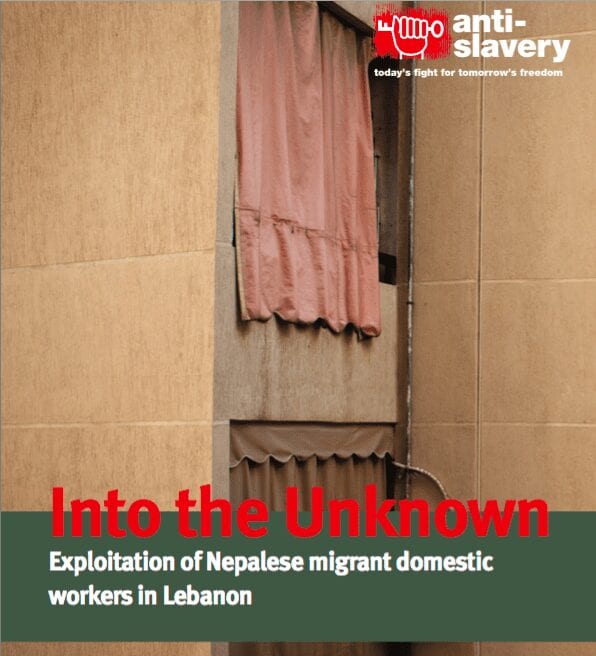
Into the Unknown: Exploitation of Nepalese Migrant Domestic Workers in Lebanon
EXECUTIVE SUMMARY FROM PUBLICATION:
“Hundreds of thousands of migrants are currently working in the Middle East in situations that can amount to forced labour and slavery. This is a direct consequence of the systems currently in place in these countries, as well as policies and practices in their home countries, including in South Asia and further afield. Research by Anti-Slavery International, KAFA – (Enough) Violence & Exploitation in Lebanon- and GEFONT – the General Federation of Nepalese Trade Unions – has identified that domestic workers from Nepal seeking legal and decent work in Lebanon are one such group who are suffering from this type of exploitation. Domestic work includes a range of tasks carried out in private homes including cooking, cleaning, washing clothes, taking care of children or the elderly, running errands and sometimes looking after an employer’s small business. Domestic workers can live in their employer’s home or independently from them, but working within the home is the single most important determinant in defining a domestic worker. Migrant domestic workers are workers who have migrated to other cities or villages, either internationally or within their own countries’ borders to find employment. Thousands of women and girls migrate every day to find work as domestic workers and provide for their families. In Lebanon alone, there is currently an estimated 200,000 migrant domestic workers. The abuse and exploitation they suffer is well documented. Until 2012, Lebanon was the top country of destination for female migrant workers. The plight of Nepalese migrant domestic workers is rooted in a continuum of vulnerabilities starting from their recruitment in their rural villages and lasting until they start work in a home in the Lebanese capital city and beyond. At every stage of the migration process and employment, they risk being abused and exploited. Many are trafficked for forced labour, with some employers forbidding them from leaving the house, confiscating their passports and using violence or threats of violence to control and force them to work, often without pay. Others fall into bonded labour as a result of the transportation and recruitment costs, as well as the commission fees charged by the agent and/or broker and incurred in taking up a job abroad. They are put in this situation as a result of inadequate policies, discrimination, lack of preparedness, isolation, and an absence of coordinated efforts to protect them. Each one of these factors can lead to serious labour and human rights violations; when combined, as they are for migrant domestic workers including for Nepalese in Lebanon, they create the conditions within which abuse and exploitation can flourish. In 2012, Anti-Slavery International launched a project looking at the situation of migrant domestic workers from Nepal, prior to and after they migrate to Lebanon. The work is implemented in partnership with KAFA in Lebanon and GEFONT in Nepal. The activities build on research undertaken in these two countries as well as India examining the legislation, policy and practice of the migration cycle in origin and destination countries, with particular reference to its impact on female migrant domestic workers. The research concluded that the combination of gender discrimination in policies, lack of relevant and accessible training pre-departure, lack of protection or little or no regulation of recruitment agencies, as well as discriminatory policies in the countries of destination, mostly through the kafala – or sponsorship system – all result in a failure to protect female migrant domestic workers. The research also showed that the vulnerabilities to abuse and exploitation suffered by migrant domestic workers are inter-related and inter- dependent; for example, even if women received appropriate pre-departure training, they would remain vulnerable to exploitation if the ban currently preventing women under 30 from migrating to Lebanon remained. Therefore, it will be only be possible to improve their situation by addressing, concurrently, the continuum of vulnerabilities to which they are subjected prior to, during and after migrating and by making them agents of change for themselves and others in similar situations. In Nepal, a model has been developed to bring relevant and adequate pre-departure information to potential female migrants in the two districts of Jhapa and Morang in a format they can easily rely on. The information is relayed by members of the community called Female Community Health Volunteers (FCHV) who have been trained on issues of safe migration, especially for women migrating for domestic work. As members of the community, these FCHV will have a better knowledge of the situation of women in these areas and will be more likely to gain their trust. Providing adequate pre-departure information to prospective migrant domestic workers is a crucial step in making migration safer for women. If they are informed of the legal steps to migration, of the realities and potential dangers linked to working abroad as a domestic workers, women are more likely to make informed decisions about their migratory plans. In Lebanon, the project also supports the development of the Nepali community of migrant domestic workers, who came together under the NARI group. The objective is to scale up and replicate this model across communities, based on lessons learnt from the Nepalese experience. As illustrated in the report, in addition to building stronger and better prepared communities of domestic workers, these interventions are also crucial to informing and strengthening the partnership’s campaign for policy and practice reforms. The project’s approach to integrating pre- departure training with post-destination community building also potentially offers a highly replicable model which could be of value to many source countries, regardless of whether they have bans in place such as in Nepal. The report presents in more details the interventions developed by the partnership, the lessons learnt to date from implementing them, as well as the impact to date. It also makes a number of recommendations for policy changes in both countries, based on the experience of migrant domestic workers and the research conducted.”
